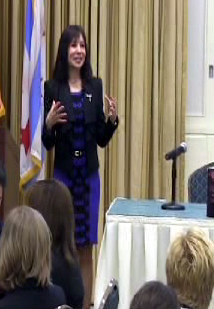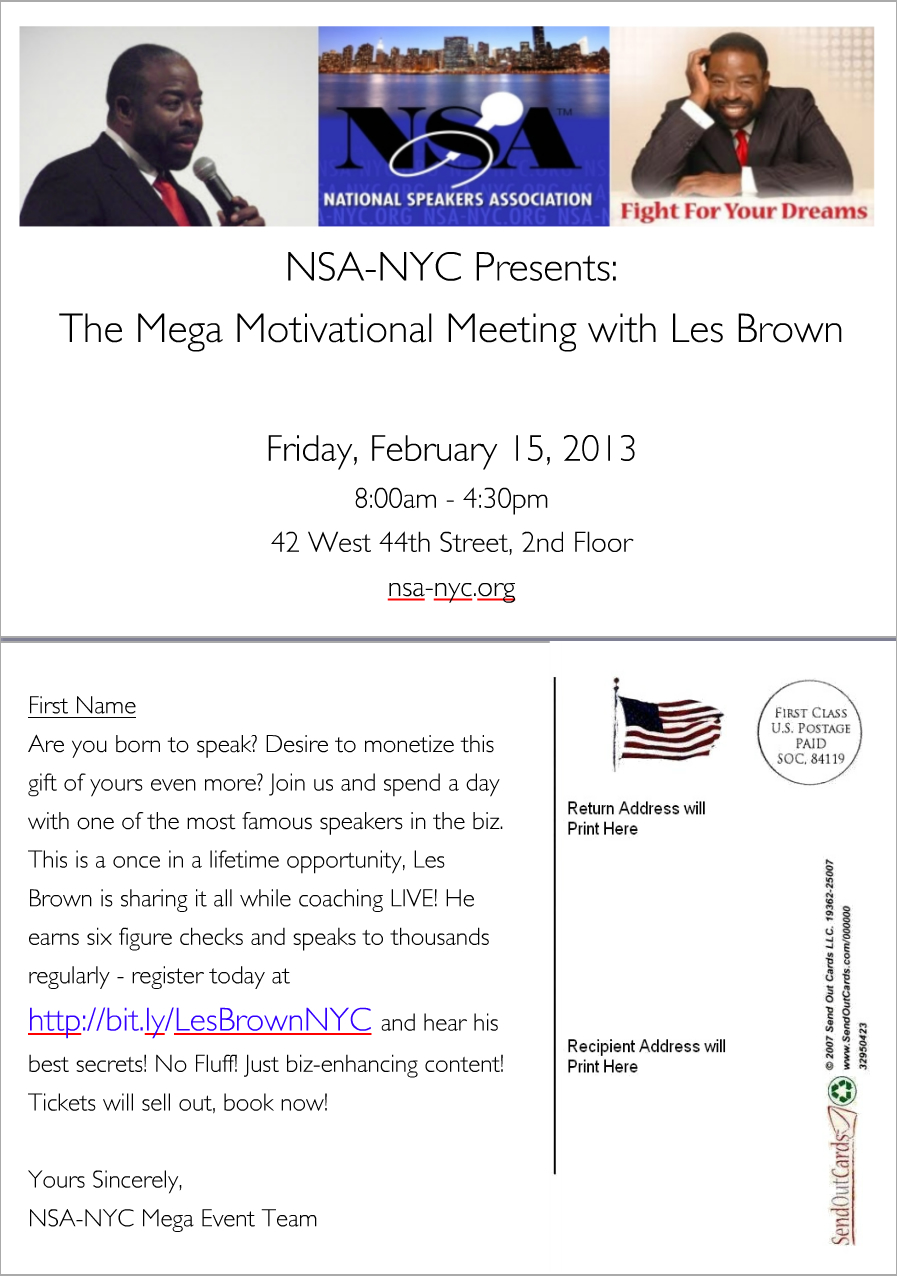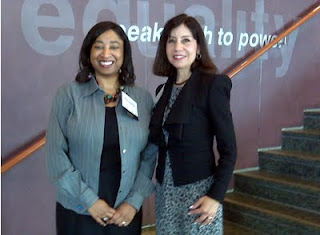There's a secret that professional speakers know but we rarely hear about it. The secret trickles out in overheard statements.
National Speakers Association Winter Conference Sees the Future
How to Be a Professional Speaker
 August 7th is Professional Speaking Day. Do you want to be a professional speaker?
I've been a professional speaker and executive speech coach for a long time. Aspiring speakers ask me all the time how they can become professional speakers. So in honor of Professional Speaking Day, here are some tips about the exciting, rewarding, and very challenging business of professional speaking.
August 7th is Professional Speaking Day. Do you want to be a professional speaker?
I've been a professional speaker and executive speech coach for a long time. Aspiring speakers ask me all the time how they can become professional speakers. So in honor of Professional Speaking Day, here are some tips about the exciting, rewarding, and very challenging business of professional speaking.
1. Professional speaking is a business. People fall in love with the glamor of being on stage before a live audience. But the truth is this. Delivering a one hour keynote or workshop is a fraction of the time that's required to make that speech happen. First and foremost, professional speakers are in the sales and marketing business. You're not a professional until someone pays you. Treat speaking as a business.
2. Professional speakers provide value. You must have a compelling story to tell or content that improves people's lives and careers. It takes time to research current trends and develop content that is relevant to your audience. Who is your market? Who will pay to hear you speak? What do they want and need to hear? What kind of return will they receive for their investment in you?
3. Professional speakers are experts. What is your expertise? Paid speakers have credentials and experience that give them credibility to speak on a selected topic.Unless you're a celebrity or reality star, you won't be hired unless you have a track record of success..That's why you don't see that many young people in the professional speaking business. A jack-of-all trades or someone who speaks on a wide array of topics will not be taken seriously.
4. Professional speakers are paid. Yes, we all do pro bono speeches for charity and for marketing to our target audience. But professionals earn their living from speaking and also maintain fee integrity. That means they have set fees for their services.
5. Professional speakers have multiple streams of income. In these challenging economic times, it's the rare speaker who earns 100% of his/her income from keynote speeches. Most professionals speakers have add-on services such as, workshops, facilitation, boot camps, consulting, coaching, off-site retreats, books and products.
6. Professional speakers are members of the National Speakers Association. I've been a member of NSA since 1991. Not all speakers are members, but if you're serious about the profession of speaking you need to get to a meeting. Join your local chapter. I'm a member of the New York chapter. NSA will change the way you think. Many speakers also belong to toastmasters. What's the difference? Toastmasters is for anyone who wants to improve their platform skills. NSA is for professional speakers who want to learn the business of speaking.
7. Professional speakers have a coach. Why? Because speakers continually need to raise the bar. Even the top speakers use a coach to fine tune their message and platform skills. If you're just starting out and can't afford a coach, find a mentor. Watch TED talks and youtube videos. Go to live events and conferences and take note of how the best speakers own the room.
The 5 Levels of Public Speaking
Speaking is a leadership skill. This infographic represents John Maxwell's 5 Levels of Leadership. As a thought leader, he recognizes that leaders have to earn their followers. It's the same way with public speaking.

I started to reflect on the many trainings, seminars, and speeches I've given over my career. I have to say that this coordinates very well with public speaking and audiences. There is a saying in the training industry: "There are two kinds of learners: prisoners and vacationers." Actually, there are five.
Prisoners are level one. They came to listen to you because they're required to be there. Their boss sent them to learn a skill or to hear a message, and they don't want to be there. They feel like prisoners.
The second kind of learner is the vacationer. They came to your presentation willingly. Their boss most likely sent them, but they see it as time off the job. So while you're not getting open resistance, you don't have a committed audience.
At level three, people are there because they know the results that you bring to an organization. Many consultants, trainers, and professional speakers have audiences that fall into this category. They may not have experienced the results first hand, but they're aware of your competence, so they're interested in listening.
Level four is when you start to experience real influence. Because at this level, you're satisfying both organizational and personal needs. That means as a public speaker, you are meeting the objectives for which you were hired, but you're also personally liked. There's a relationship with the audience and the person who hired you. Here is where you begin to move from being a vendor to a partner. There is a trust at this level. The audience knows, likes, and trusts you.
Level five is the ultimate of professional or public speaking. Here is where you are a thought leader. Beyond satisfying organizational and personal needs, your reputation precedes you. You may even experience celebrity in a sector or niche industry. You may not be a household name, but you're a known and respected expert - someone who is an authentic leader on the platform.
Speak Your Way to Phenomenal Success
I'm promoting this NSA event in February - The Mega Motivational Meeting. Les Brown, the top motivational speaker, is coming to New York. Click the postcard for more information.
Speaking at UMBC
 The University of Maryland Baltimore County invited me to give a keynote and workshop on How to Give a Knockout Presentation.
Doctoral students, many of whom are underrepresented in STEM (Science, Technology,
Engineering, and Mathematics), attended the PROMISE Summer Success Institute. I was honored to be invited to speak. The students were eager to learn and highly participative. Social media takes speaking to a new level. There was live tweeting during the panel and my keynote. It takes real confidence to keep speaking while the audience is twittering away. It was fun to read the comments. By the way, they found me on twitter, so I'm not complaining. Here I am with Dr. Tull, who invited me to speak. Just as in business, the university has brilliant students who are not always brilliant presenters. The goal was to convey how to communicate with confidence and clarity especially when defending their dissertations and pitching ideas to their professors. We talked about the importance or reading the audience and code switching to accommodate a professor's supportive or confrontational style. Each student learned how to give a brief elevator speech and recognized the importance of personal rapport. Whether you're in school or the workplace relationships are the key to success.
The University of Maryland Baltimore County invited me to give a keynote and workshop on How to Give a Knockout Presentation.
Doctoral students, many of whom are underrepresented in STEM (Science, Technology,
Engineering, and Mathematics), attended the PROMISE Summer Success Institute. I was honored to be invited to speak. The students were eager to learn and highly participative. Social media takes speaking to a new level. There was live tweeting during the panel and my keynote. It takes real confidence to keep speaking while the audience is twittering away. It was fun to read the comments. By the way, they found me on twitter, so I'm not complaining. Here I am with Dr. Tull, who invited me to speak. Just as in business, the university has brilliant students who are not always brilliant presenters. The goal was to convey how to communicate with confidence and clarity especially when defending their dissertations and pitching ideas to their professors. We talked about the importance or reading the audience and code switching to accommodate a professor's supportive or confrontational style. Each student learned how to give a brief elevator speech and recognized the importance of personal rapport. Whether you're in school or the workplace relationships are the key to success.
